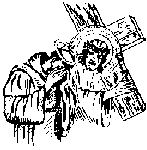THE ROMAN CATHOLIC CHURCH
Her Doctrine and Morals
Second Sunday after Pentecost
2 June 2024
![[Image]](ss.gif)
THE ROMAN CATHOLIC CHURCHHer Doctrine and MoralsSecond Sunday after Pentecost2 June 2024 |
The SundaySermon
|
Click the button on the right to be told about updates. Your address will be kept strictly private. |
Dear Friends,
Today's Gospel reading (St. Luke 14:16-24) gives us the parable of the great Supper. Many who were invited refused to come. There were (are) three primary reasons given. 1.) The pride of life, or the spirit of dominion — "I have bought a farm and must go and see it." 2.) Concupiscence of the eyes, or curiosity — "I have bought five yoke of oxen, and I must try them." 3.) Concupiscence of the flesh, or pleasures of the body — "I have married a wife and cannot come." Humanity has not changed in any essential manner since the first sin in Paradise. The world, the flesh, and the devils are constantly trying to exploit our weaknesses.
Jesus Christ has come to teach us and show us by His example how to resist and overcome the temptations from without and strengthen ourselves against the weaknesses from within us. The first lesson in our spiritual education is to define and understand the problem. Today's parable is such a lesson. Our purpose or goal is to reach Heaven (the Great Supper). We have been invited to Heaven by our Creator (We have been made for Heaven), Redeemer (The cost of our entrance to Heaven has been paid), and Sanctifier (We have been made worthy to enter Heaven.)
However, over time, we lose sight of the goal or become distracted by lesser goals. We allow our priorities to get out of order. Many fail or refuse to heed the invitation in the decisive moment of grace. We make excuses for not wanting to go to Heaven. Perhaps we think that we will get another opportunity. However, if we note the parable, we see that those who refused the invitation will never taste the supper. God is merciful, and He gives us many ample opportunities. Still, a final and decisive moment will seal our souls forever — either eternally united with Him in Heaven or eternally separated from Him in Hell.
The Heavenly Banquet should not be taken literally; it is a parable. Heaven is not made to satisfy our present earthly appetites; it is for our spiritual appetites. The pleasures of the soul are shared with the body, and so both body and soul can enjoy the Heavenly Banquet. However, the pleasures of the body are not necessarily shared by the soul. Often, the pleasures of the body are obstacles to the true pleasure of our souls. This is demonstrated in today's parable.
Our priorities must be first the eternal welfare of our souls and then secondly the physical wellbeing of our bodies. We must be cautious not to invert this order.
We now see from the parable the problem we all must face. We have been invited to Heaven, and when we are called, we must be ready to drop everything and go. However, we are more than likely to be preoccupied with the pursuits of the three-fold concupiscence. These preoccupations tempt us to refuse God. In this, we imitate the fallen angels. In imitating the devils, we will share with them the eternal pains of never tasting the joys of Heaven.
The solution to this problem is to keep our priorities in order. We are made for Heaven. This world is not our home. While we can legitimately enjoy the things of this world, we must never allow them to take the first place in our hearts, minds, and souls. That first place belongs only to God.
In the parable, we see those who did come to the feast—"the poor, and the feeble, and the blind, and the lame." These are people who are not attached to this life. They are unencumbered by the threefold concupiscence. Although many consider their present life unfortunate, they are truly blessed because their misfortune brought them to the eternal joy of Heaven, which is most fortunate.
The world often looks down upon religious and clerical life. The world, obsessed with the threefold concupiscence, cannot or will not ever understand the vows of poverty, chastity, and obedience. The world sees the poor, feeble, blind, and lame as cursed by God or nature because they cannot truly embrace the pleasures of this life. The vows of poverty, chastity, and obedience are seen as foolishness because religious who are fully capable of enjoying worldly pleasures knowingly and willingly give them up.
In God's eyes, the people least attached to this life and its concupiscence have chosen the wiser and better part. They spend their days eagerly awaiting the call to enter the Heavenly Banquet and are always ready when it comes. They have no care for dominion, curiosity, or the lusts of this life.
Let us pray that more souls receive and follow these vocations from God. The more people that answer God's calls, the more God's blessings will enter the world and the better this world will be for everyone.
May the Immaculate Heart of Mary inspire, guide, and protect us!
 |
|
Would you like to make a donation?
Or, just log onto PayPal.com, after signing in you can send your donation to us at: Friars@friarsminor.org .
Return to Menu.
Return to Homepage.